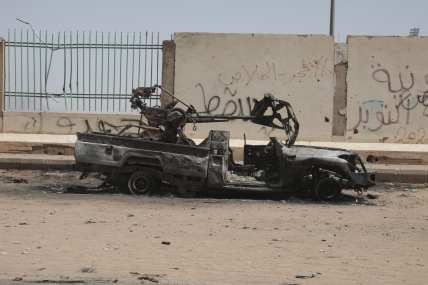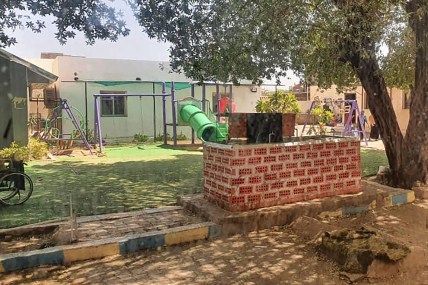Report claims war crimes in Sudan as civilians attacked, sexually assaulted
The conflict has turned Khartoum and other urban areas into battlefields.
CAIRO (AP) — Sudan’s warring parties have committed extensive war crimes in the ongoing conflict, including deliberate killings of civilians and sexual assault, a leading rights group said Thursday.
The east African country plunged into chaos in mid-April when monthslong tensions between the military and a powerful paramilitary group, the Rapid Support Forces, exploded into open fighting in the capital of Khartoum, and elsewhere in the country.

Amnesty International’s 56-page report said civilians were killed and wounded in targeted attacks. The group also reported women being raped, with some held in conditions “amounting to sexual slavery” mostly in the capital, Khartoum, and the western region of Darfur.
“Sexual violence has been a defining element of this conflict since the beginning,” Donatella Rovera, co-author of the report, told The Associated Press. “Civilians really have no good options. It’s difficult for them to leave. It’s incredibly dangerous for them to stay.”
Almost all rape cases were blamed on the RSF and its allied Arab militias. The report said the RSF abducted 24 women and girls – as young as 12- and held them “for several days during which they were raped by several RSF members.”
Rovera said that war crimes such as sexual assault are happening, ”on what seems to be a large scale.”
The RSF, which evolved from the notorious Janjaweed militias, was also blamed for most of the deliberate attacks, Amnesty said. Some members of the military were also accused of the crimes, the report said.
Responding to the report, the military said it had established a unit to try to minimize civilian harm while the RSF denied allegations of sexual violence, as well as carrying out violent acts in West Darfur.
The conflict has turned Khartoum and other urban areas into battlefields. Darfur — which had been the scene of genocidal war in the early 2000s — saw some of the worst bouts of violence with the current fighting turning into ethnic clashes.
The fighting forced about 4 million people to flee their homes, either to safer areas inside Sudan or to neighboring countries, according to the U.N. migration agency.
The violence in Darfur was mostly blamed on the RSF and its allied Arab militias which the group said targeted the African Masalit community in the region. The group said armed men from the Masalit allegedly also targeted Arabs suspected of siding with militias.
Amnesty detailed waves of violence in West Darfur province —one of five constituting the Darfur region — including the killing of civilians, looting and destruction of homes and facilities such as the main hospital and markets.

The killing of West Darfur Gov. Khamis Abdalla Abkar on June 14 — following his detention by the RSF — promoted an exodus of many members of the Masalit community to eastern Chad, which turned into an open camp for those who fled the fighting in Darfur, Amnesty said.
“Civilians throughout Sudan are suffering unimaginable horror every single day,” said Agnès Callamard, the group’s secretary general. She called on the warring sides and their affiliated groups to “end their targeting of civilians, and guarantee safe passage for those seeking safety.”
On April 20, an attack in Khartoum’s southern neighborhood of Kalakla killed three children from the same family as they tried to escape the gunfire, the group said, adding that it was not able to determine which side was responsible for the killing.
Amnesty quoted Kodi Abbas, a 55-year-old teacher, whose two sons and nephew were killed, as saying they “were small and couldn’t run away fast enough…I don’t know who shot them. The war killed them.”
The group said it also documented an attack by the RSF on the complex of the Mar Girgis Coptic church in Khartoum’s Bahri district. RSF members in a pick-up vehicle stormed the church, shooting five members of the clergy, and stole money and a gold cross, the report said citing witnesses.
“They were shouting and insulting us – saying things like, ‘Egyptian dogs and sons of dogs’ – and asking for money and gold,” an unidentified survivor was quoted by the human rights group.
Amnesty’s report was the latest one documenting atrocities in Sudan’s conflict.
Last month, Human Rights Watch called for the International Criminal Court to investigate atrocities in Darfur, including “summary executions” of around three dozen non-Arab tribesmen in a Darfur town.
The U.N. Human Rights Office said a mass grave was found outside the town of Geneina with at least 87 bodies, citing credible information. And the International Criminal Court’s prosecutor, Karim Khan, told the U.N. Security Council in July he was investigating alleged new war crimes and crimes against humanity in Darfur.
“There are allegations that this could be ethnic cleansing,” said Rovera, “The situation is a very difficult one, is a very dangerous one because it can escalate further.”
TheGrio is FREE on your TV via Apple TV, Amazon Fire, Roku, and Android TV. Please download theGrio mobile apps today!


